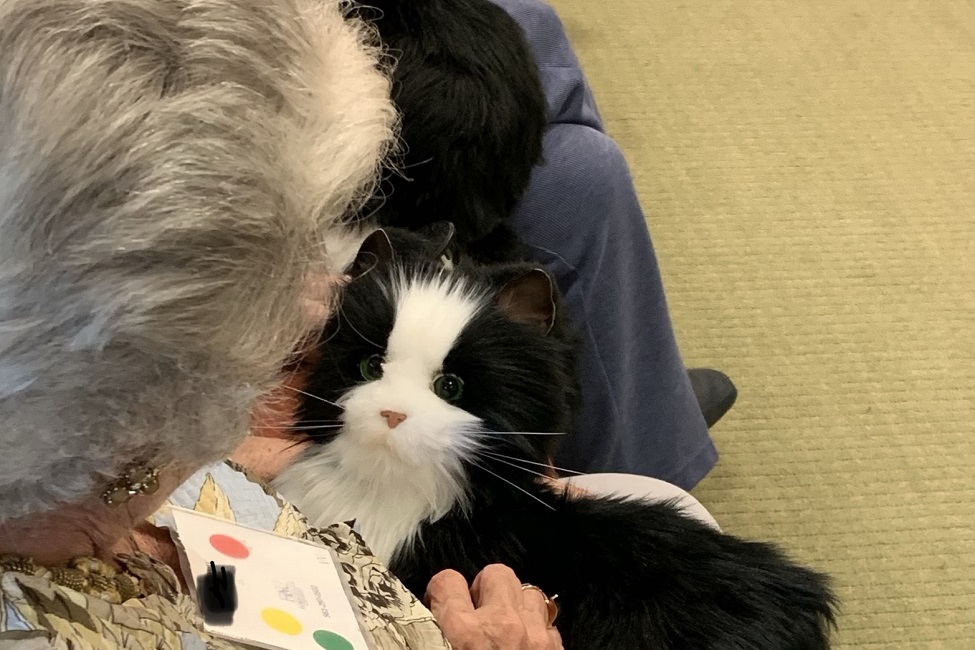Robotic Cats Are ‘Purr-fect’ Companions for Isolated Seniors

Designed to respond to motion, touch and sound, these interactive robotic pets offer an alternative to traditional pet therapy. Robotic pets are usually given to people with Alzheimer’s disease and other related dementias, but data has shown that using them to decrease social isolation for older adults is highly successful.
In the wake of widespread social distancing and isolation due to the COVID-19 pandemic, people who have pets have gained a greater appreciation for the unconditional love and companionship they provide. However, for many older adults, especially those living with Alzheimer’s disease and/or related dementias (ADRD), caring for a pet is difficult. Moreover, because of the pandemic, people with ADRD and their caregivers remain alone for extended periods of time.
Researchers from Florida Atlantic University’s Christine E. Lynn College of Nursing provide the “purr-fect” solution to comfort and engage older adults with ADRD – interactive robotic cats. Designed to respond to motion, touch and sound, these interactive robotic pets offer an alternative to traditional pet therapy. Robotic cats and dogs are usually given to people with ADRD, but data has shown that using these pets to decrease social isolation for older adults is highly successful.
In fact, while completing her Doctor of Nursing Practice degree from FAU’s Christine E. Lynn College of Nursing last year, Bryanna Streit, D.N.P., demonstrated how these interactive pets help to combat social isolation and depression among older individuals and people living with ADRD by improving overall mood and quality of life. Family caregivers also experienced a reduction in stress, and benefited when companion pets allowed increased engagement with the older adult and their environment.
“What we saw from the robotic, interactive pets project is that it appeared to provide our day care participants with a companion that prompted them to speak to the pet often as well as share their feelings,” said María de los Ángeles Ordóñez, D.N.P., A.P.R.N., an associate professor and director of FAU’s Louis and Anne Green Memory and Wellness Center, which is operated by FAU’s Christine E. Lynn College of Nursing. “Participants seemed to believe that the pet was responding to their statements through meowing, turning their head, or blinking their eyes, and that they were ‘having a conversation’ with the pet.”
Streit’s DNP project used interactive toy pets to provide participants with an alternative way to express themselves. Participants often stroked and spoke to their pets, sharing their feelings openly. Several family members reported that their loved one slept with their pet following the program’s conclusion.
The project assessed the effectiveness of this non-pharmacological therapeutic interactive therapy in 12 adults aged 50 and older with ADRD who were attending the Louis and Anne Green Memory and Wellness Center during the day. Over the course of 12 visits, mood and behavioral symptoms as well as cognition were evaluated using the Alzheimer’s Disease and Related Dementias Mood Scale (AD-RD), the Observed Emotion Rating Scale (OERS), the Cornell Scale for Depression in Dementia (CSDD) and the Mini Mental State Exam (MMSE) – a widely used test of cognitive function among the elderly.
Results from the project showed that all scores significantly improved between participants following the intervention with the interactive pet. More than half of the participants scored higher on the MMSE post-test than the pre-test. Post-test scores overall on the AD-RD mood scale were six points higher than pre-test scores. The OERS showed higher scores indicating a more positive mood. Post-test scores on the CSDD were significantly higher than pre-test scores.
“The robotic pets provided a means of engagement and entertainment and also evoked participants to share memories of their previous pets. As a group activity, it also offered opportunities for the participants to communicate with each other,” said Lisa Kirk Wiese, Ph.D., R.N., an assistant professor and Streit’s faculty chair, in FAU’s Christine E. Lynn College of Nursing. “Using interactive pets was beneficial to our adult day center attendees as evidenced by the increase in their test scores. We believe that these pets also will help older adults who are socially isolated due to the pandemic.”
FAU’s Christine E. Lynn College of Nursing received 12 robotic pets for the project with assistance from an FAU Iota Xi Sigma grant, and with funding supplementation from Tom Cantarino, president of Ageless Innovation. In addition, FAU’s Louis and Anne Green Memory and Wellness Center has received 20 robotic pets from the Florida Department of Elder Affairs (FDEA) to distribute to the center’s patrons. The FDEA distributed more than 375 of these therapeutic robotic pets to socially isolated seniors and adults living with ADRD to address challenges during the pandemic.
“COVID-19 has forced many family members to end visits to parents and grandparents or stop visiting older loved ones in nursing homes and assisted living facilities,” said Safiya George, Ph.D., dean of FAU’s Christine E. Lynn College of Nursing. “While this is an essential step in reducing transmission of the virus, this physical distancing is causing isolation and loneliness. Outreach efforts from our Louis and Anne Green Memory and Wellness Center using robotic interactive pets is helping to improve the quality of life for those who are especially vulnerable under the current conditions of the pandemic.”
-FAU-
Tags: community | research | coronavirus | nursing | faculty and staff | students